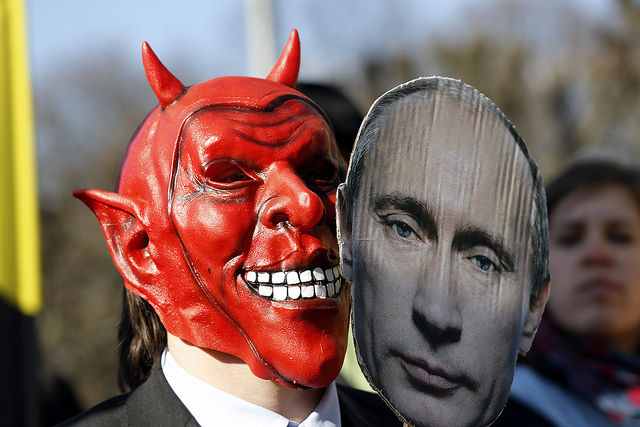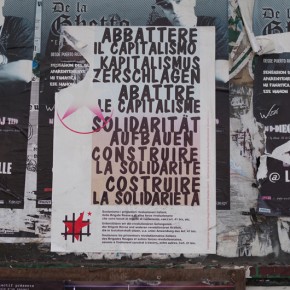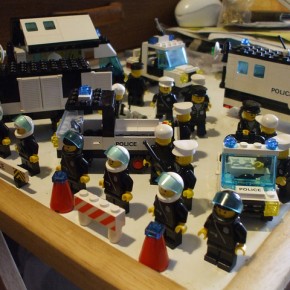Last year, many commentators in the West were aghast at the Russian stance on the Syrian civil war. It was in early 2013 when Russia and China presented a united opposition at the UN Security Council to intervention in Syria. It was also flabbergasted at the Russian opposition, in the summer of 2013, to Obama’s proposed ‘punitive measures’ (read: indiscriminate bombing.)This was after Assad’s use of chemical warfare, which led to Putin pledging more military hardware as a gesture of support. The proponents of ‘humanitarian interventions’ will pretend that Vladimir Putin succeeded in deterring the Americans.
In reality, the US government would have gone ahead whatever the Security Council concluded if it had really wanted to intervene. It certainly didn’t stop when the UN opposed the occupation of Iraq. The sudden capitulation may have been more symptomatic of a lack of strategy in Washington than anything else. The Sino-Russian veto was a convenient pretext not to directly intervene and watch the conflict play out.
The US proposal of ‘punitive measures’ was a lot like Israeli airstrikes against Syria in early 2013. Nothing constructive could’ve come of it, and nothing productive was likely intended. Once again, there was no great loss in waiting it out in the absence of any willing military collusion. In the United Kingdom, parliamentary debate on Syria opposed the government’s stance and – for the first time since 1782 when the British conceded American independence – the country had to rule out getting involved.
In the end, Obama decided to hold back until Assad had gotten rid of his chemical weapons. The US government may well have concluded that it would be best to draw out the conflict for as long as possible, ensuring long-term instability that occupies various forces in the country. Everyone is playing the Syrian game right now: militants, Iranians, and so on. As long as there is no unanimous victor, there is no impetus to bomb.
Putin backed the move to clean Syria of chemical weapons for the very opposite reason: if the secular nationalist regime can survive, then there is the possibility of a stability beneficial to Russian interests. This is the crux of the matter. The US has a vested interest in regional instability, which keeps its alleged enemies busy, whereas Russia has an opposing interest in stability that may allow a new assertion of regional influence. On Syria, these interests ultimately converged, and settled on chemical weapon disarmament.

Old Friends, New Wars
This is not to say that Putin’s opposition should be mistaken as a unique position. It shouldn’t be forgotten that Putin was vocal in his opposition to the NATO intervention in Libya just three years ago, and had come out in opposition to the invasion of Iraq in 2003. We can read this as cold cynicism on Putin’s part. Much like Saddam Hussein, and Maummar Gaddafi, Bashar al-Assad has had long-standing ties to the Russian government far before becoming a “frenemy” of the US and UK.
NATO powers only turned against Gaddafi when the Benghazi rebel leadership made clear that they would respect old oil arrangements. As we now know, Putin was somewhat prescient in his official warnings about instability in the country, since the consequences have been to rid Libya of a menacing tyrant only to leave a power vacuum behind.
The irony is that it was probably Assad who handed over Gaddafi’s satellite phone details to the French. The former ophthalmologist hoped to secure a ‘grace period’ in which the French government would not pressure Syria, and would also not call for military strikes against the regime. It is unlikely that Putin places bets on the solidarity of his allies, and acted independently in spite of them. The extent of Russia’s willingness to ward-off NATO aggression and expansion can also be seen in earlier examples such as his decision-making process before invading Georgia in 2008.
We have to understand Putin’s government as distinctly post-Soviet. This isn’t to say that the foreign policies of the Russian Federation are completely different to those of the Soviet Union. Rather, it is the case that the policies are shaped by the legacy and absence of the Soviet system. In the decades after World War II, the USSR backed Israel in an attempt to create a protectorate independent of US and British interests. It did this while simultaneously warming up to new anti-colonial leaders such as Gamal Abdul Nasser and later, Colonel Gaddafi. By the 1970s, the Soviet Union had also forged alliances with the Ba’athist regimes of Syria and Iraq. Putin is trying to continue much of this under new conditions.

History’s Cunning
Although Putin had been an opponent of the NATO intervention in Kosovo, taking the side of Serbia along with his superiors, he did not hesitate to join forces with the US in the War on Terror once he was personally at the helm. It was precisely because the Russian Federation had waged a savage war on Muslim-majority Chechnya after its bid to become an independent nation that Putin was so eager to align himself with the US.
The US had no problem with the campaigns in Chechnya. Putin backed the invasion of Afghanistan based on the understanding that the Bush Administration would continue to support the Russians on the basis of counter-terrorism.
In Afghanistan, the Taliban was backed by the Saudi royal family, where they terrorized the Shi’a minority and murdered Iranian diplomats while redirecting energies from the Islamic Revolution. In fact, Iran came pretty close to invading Afghanistan after the Taliban came to power. Neither the Russians nor the Iranians had any reason to keep the Taliban around. Perhaps both of them hoped regime change would allow the country to be opened up to non-American interests, principally seeing the country as a route for fuel pipelines.
Yet in 1979, the Soviet Union intervened in Afghanistan for six years after its own Communist party, acting independently of its Soviet allegiances, seized power from the pro-Western monarchy. In the run-up to all of this, the US took the step of providing material support to form the Mujahideen in what Zbigniew Brzezinski would later describe as a mission to draw the Soviets into a battle they couldn’t win. It seemed clear that the Soviet Union had a vested interest in preserving the regime in Kabul. Jimmy Carter was keen to ensure long-term instability to undermine the same regime.
At the same time, the Soviet Union had not expected such resistance from such an impoverished country and Brezhnev had predicted a swift victory. The Soviets began to dress their policy towards Afghanistan in the language of the forgotten civilizing missions of European empires. Later the journalist Alexander Cockburn would read out a portion of a document seized during the Iran Hostage Crisis on the eve of the NATO-ISAF war in 2001:
The United States’ larger interest would be served by the demise of the Tareki-Amin regime despite whatever setbacks this might mean for future social and economic reform in Afghanistan. The overthrow of the Democratic Republic of Afghanistan would show the rest of the world, particularly the Third World, that the Soviet’s view of the socialist course of history being inevitable is not accurate.
In the light of all of this, Putin supported an American crusade in Afghanistan waged with the same pretenses of spreading civilization that the USSR once engaged in. Except now it wasn’t to protect a Russian-linked regime in Kabul. Putin could do without the Taliban, although he was no doubt happy that they forced out the remnants of the Mujahideen backed by the United States.
The US invasion would replace the Taliban with the ‘Northern Alliance,’ a string of warlords, who had been heavily involved in the Mujahideen in the 1980s; and who had virtually destroyed Kabul in the early 1990s. At a more cynical level, Putin could rest assured seeing the US bogged down in an exhaustive war with many similarities to the Soviet campaign twenty years earlier.

Robbing the Dead
The example of Afghanistan is not to be taken in isolation. Soon, the Bush Administration set out to attack Iraq, dressing its actions in a defensive rhetoric. Putin would not climb aboard for this invasion, recalling his opposition to intervention in Kosovo. For Putin, supporting war is to be done on a case-by-case basis. The Russian Federation had used the Oil for Food programme to gain privileged access to Iraq’s most precious commodity after the Gulf War. Saddam Hussein was a crucial partner in the UN programme, as it empowered his control over Iraqi society, allowing his regime to perpetuate itself, even as hundreds of thousands died of starvation.
By February 2003, Putin had taken decided the invasion of Iraq would be a grave mistake. The Russian Federation was now aligned with not just China, but the leading European powers of Germany and France. Millions of people marched around the world to stop the war. The Russian President had already decided on his next move. He had sent his envoy Yevgeny Primakov to Baghdad to give Saddam a stern message. Putin told Saddam that if he would step down from his post as President voluntarily and allow democratic elections then he could stay in the country and keep his party post. Putin thought it was the last chance to avoid war. It was a tough sell for Primakov to make.
As Robert Fisk reflected, Saddam Hussein had received similar warnings from Mikhail Gorbachev in 1991. In Primakov’s view, this would have worked had the Iraqi dictator not dawdled for so long, and in the end, his offers were rejected by the US government.
It’s not clear if the Iraqi regime were convinced that the Americans weren’t serious, or if they were resigned to what seemed inevitable by this point. Whatever the case may have been, Saddam rejected Putin’s offer in 2003 as well. It was not long before devastation that was wrought on Iraq by economic strangulation throughout the 1990s was then superseded by unbridled military aggression. The consequences would reverberate for years to come.

The Chechen Factor
The common factor is that Putin knows that Russia cannot reach too far beyond its borders. Even Stalin, and certainly the Tsars, enjoyed far greater reach than Moscow does today. Putin’s primary interest is in the consolidation of the state and the maintenance of its power. As recent events in Ukraine, and less recently in Georgia, demonstrate, Putin wants to secure the body national. The strategic worth and energy wealth of West Asia comes down to the possibilities it offers by way of stability and economic growth for Russia.
Sometimes, though, the interests are even more straightforward. Take Syria. The Assad regime had maintained itself as a wedge between the Sunni elite and the Alawite military leadership. Originally, the uprising had a popular secular and democratic character (though these elements still exist) which included a diverse base. It was during the crackdown that it spiraled into a cycle of violence in which a flood of Sunni Islamists began to gain strength.
As the uprising descended into a bloodbath, Putin’s eyes probably noted the hundreds of miles between Syria and Chechnya. The fact that the Chechen cause of independence from Russian domination has drawn Islamists from the Arab world must be unsettling. The prospect of an Islamic state emerging from the chaos in Syria may send shockwaves throughout the region, and could bolster Chechen Islamists that Putin has been fighting for over a decade.
Western analysts forget that the Yeltsin era ended with clandestine operations in Chechnya escalating into a full-blown war. By the time Putin was made Prime Minister in 1999, the conflict had entered its second phase. Faced with the apartment bombings of September 1999, which killed 294 people, and injured hundreds more, Putin was quick to strike back, posing as their avenger. It’s been almost 15 years since the bombings. and Putin has overseen the official end of the Second Chechen War in 2009 only to face a sustained Islamist insurgency in the Northern Caucasus.
However, from Putin’s perspective, the war was a success. Putin does not want a radical redefinition of the world order. He desires other states to be bogged down, while he builds a new Russian identity (which has most recently targeted homosexuals) and develops the economy to ensure national stability. For Putin, West Asia as it is provides the best opportunity for his objects.
As the crises continue, it will be easy to predict his reaction based on these core interests. We have already seen a preview of the future in Putin telling Abdel Fattah al-Sisi that his presidency can count on Russian support. It won’t be the last time we’ll be talking about Putin’s Asia.
Photographs courtesy of Michaela, Number 10, United Nations Photo, Fabia Bromann, and Za Rodinu. Published under a Creative Commons License.





